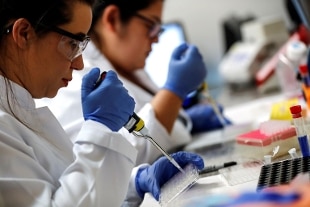The EU Commission authorizes Remdesivir for treatment against Covid-19
Share
03 July 2020
The first drug approved in the US and now also in the European Union to combat the disease caused by the Sars-CoV2 virus is a drug created to fight the Ebola virus.
Remdesivir, a drug developed by Gilead and a candidate, since the beginning of the pandemic, is one of the most useful "weapons" against the virus.
Here is an identikit of the antiviral that could (but the conditional is a must) represent a therapeutic turning point.
HOW THE REMDESIVIR IS BORN
The drug was developed around the 2000s thanks to a technology - ProTide - developed by Chris McGuigan at Cardiff University.
It is a technology that allows to effectively synthesize a series of molecules that are precursors of the actual drug - they are called prodrugs - and that generally are activated thanks to the interaction with the human body.
HOW IT WORKS
It is a monophosphoramidate prodrug of an adenosine analogue which has a broad antiviral spectrum including filovirus, paramyxovirus, pneumovirus and coronavirus.
It is a potent inhibitor of SARS-CoV-2 replication in human nasal and bronchial respiratory tract epithelial cells.
In a non-lethal rhesus macaque model of SARS-CoV-2 infection, early administration of Remdesivir was shown to have significant antiviral and clinical effects (reduction in pulmonary infiltrates and viral titers in bronchoalveolar lavages compared to vehicle alone).
EXPERIMENTATION WITH THE EBOLA VIRUS
The drug was developed very quickly to be used in the 2013-2016 Ebola epidemic in West Africa, and after tests on animals, it was administered to a patient.
The drug was then used during the 2018 Ebola outbreak in Congo where it was declared ineffective by Congolese health officials after testing other monoclonal antibody-based drugs.
EFFECTIVE AGAINST OTHER CORONAVIRUS
In laboratory tests, Remdesivir was effective against other coronaviruses which in recent years have given rise to a series of pandemic outbreaks: that of SARS and that of MERS.
In vitro, Remdesivir inhibits all human and animal coronaviruses tested to date, including SARS-CoV-2, and has shown antiviral and clinical effects in animal models of SARS-CoV-1 infections and Middle Eastern respiratory syndrome (MERS) -CoV.
WHEN WAS IT USED AGAINST SARS-COV2?
Given the in vitro results against other coronaviruses, the drug was made available immediately at the beginning of the first epidemic phase in Wuhan.
Remdesivir has been at the center of numerous applications first in China and then also in Europe and also in Italy.
Our country was among the first to adopt it.
In fact, it was already present in the therapeutic protocols that were applied to treat the first two Chinese patients who were hospitalized at Spallanzani in Rome in February.
Among the coronavirus patients given Remdesivir was also the first American patient given "for compassionate use" after he developed pneumonia.
The patient was repatriated after being quarantined on the Diamond Princess cruise ship which docked in Yokohama, Japan.
THE LANCET STUDY
The results of the Remdesivir clinical trial first appeared in the Lancet.
The English magazine published the results of a trial carried out in China between February 6, 2020 and March 12, 2020, on a group of 237 patients who were enrolled and randomly assigned to a treatment group (158 to Remdesivir and 79 to to placebo).
In that study, the researchers did not reveal any statistically relevant benefit associated with the drug in the patients' disease course.
The only clue that emerged from that research in favor of the drug was a "non-statistically significant" finding that patients who received Remdesivir had a numerically faster time to clinical improvement than those who received placebo among patients. with symptom duration of 10 days or less.
THE TRIAL IN THE USA AND THE GOAL
The study conducted by the National Institute of Health (NIH) is the one that has clarified the effects of the drug on a larger scale. The study was in fact conducted on a larger sample of patients: 1063 and began on 21 February. Hospitalized patients with advanced COVID-19 and pulmonary involvement who received Remdesivir recovered more rapidly than similar patients who received placebo. Preliminary results indicate that patients who received Remdesivir had a 31% faster recovery time than those who received placebo. Specifically, the median time to recovery was 11 days for patients treated with remdesivir compared with 15 days for those who received placebo. The results also suggested a survival benefit, with a mortality rate of 8.0% for the remdesivir group versus 11.6% for the placebo group. Results that in May led the normally staid Anthony Fauci, the "super virologist" of the White House, to unbalance, according to whom the drug "can block the virus". Hence the boom on the Gilead Stock Exchange, even if the WHO has slowed down, stressing that "it will take months to obtain definitive data".

